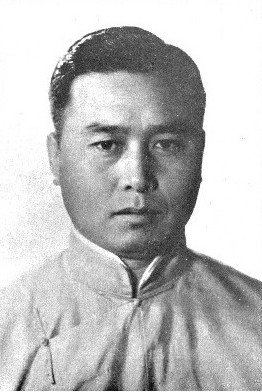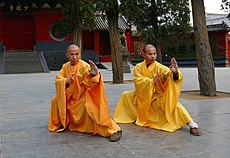
Chinese names are personal names used by individuals from Greater China and other parts of the Sinophone world. Sometimes the same set of Chinese characters could be chosen as a Chinese name, a Hong Kong name, a Japanese name, a Korean name, a Malaysian Chinese name, or a Vietnamese name, but they would be spelled differently due to their varying historical pronunciation of Chinese characters.

In Christianity, a disciple is a dedicated follower of Jesus. This term is found in the New Testament only in the Gospels and Acts. In the ancient world, a disciple is a follower or adherent of a teacher. Discipleship is not the same as being a student in the modern sense. A disciple in the ancient biblical world actively imitated both the life and teaching of the master. It was a deliberate apprenticeship which made the fully formed disciple a living copy of the master.
Laowai is the Pinyin pronunciation/transliteration of 老外, an informal term or slang for "foreigner" and/or non-Chinese national, usually neutral but possibly impolite or loose in some circumstances. Formal and polite Chinese terms for foreigner include wàiguórén, wàibīn, guójì yǒurén国际友人; 國際友人; 'international friend') and wàiguó pengyou. "Laowai" is commonly used to refer to foreigners of non-Asian ethnicities. The term usually does not refer to ethnic Han of non-Chinese citizenship or other Asian ethnicities.
Rōshi (老師) is a title in Zen Buddhism with different usages depending on sect and country. In Rinzai Zen, the term is reserved only for individuals who have received inka shōmei, meaning they have completed the entire kōan curriculum; this amounts to a total of fewer than 100 people at any given time. In Sōtō Zen and Sanbo Kyodan it is used more loosely. This is especially the case in the United States and Europe, where almost any teacher who has received dharma transmission might be called rōshi, or even use it to refer to themselves, a practice unheard of in Japan.
An honorific is a title that conveys esteem, courtesy, or respect for position or rank when used in addressing or referring to a person. Sometimes, the term "honorific" is used in a more specific sense to refer to an honorary academic title. It is also often conflated with systems of honorific speech in linguistics, which are grammatical or morphological ways of encoding the relative social status of speakers. Honorifics can be used as prefixes or suffixes depending on the appropriate occasion and presentation in accordance with style and customs.

Liu Shifu also known as Sifu, was a Chinese assassin and politician. He was an Esperantist and an influential figure in the Chinese revolutionary movement in the early twentieth century, and in the Chinese anarchist movement in particular. He was a key figure in the movement, particularly in Guangdong province, and one of the most important organizers in the Chinese anarchist tradition. He is sometimes considered as the Pierre-Joseph Proudhon of China.
Kung Fu master or Kung Fu Master may refer to:
Sensei, also known as Seonsaeng, Tiên sinh or Hsien sheng/Xiansheng, is an East Asian honorific term shared in Japanese, Korean, Vietnamese and Chinese; it is literally translated as "person born before another" or "one who comes before". In general usage, it is used, with proper form, after a person's name and means "teacher". The word is also used as a title to refer to or address other professionals or people of authority, such as clergy, accountants, lawyers, physicians and politicians or to show respect to someone who has achieved a certain level of mastery in an art form or some other skill, e.g., accomplished novelists, musicians, artists and martial artists.
In Chinese-speaking societies around the world, an honorific title is attached after the family name of an individual when addressing that person. Aside from addressing colleagues or family of equal or lesser rank, it is considered impolite to refer to others by their name only.
Shifu or sifu is a Chinese title for a teacher or skilled tradesman.
Grandmaster and Master are titles used to describe or address some senior or experienced martial artists. Typically these titles are honorary in nature, meaning that they do not confer rank, but rather distinguish the individual as very highly revered in their school, system, or style.
Oshō (和尚) is a Buddhist priest ; honorific title of preceptor or high priest. The same kanji are also pronounced kashō as an honorific title of preceptor or high priest in Tendai or Kegon Buddhism and wajō as an honorific title of preceptor or high priest in Shingon, Hossō, Ritsu, or Shin Buddhism.
Philippine kinship uses the generational system in kinship terminology to define family. It is one of the most simple classificatory systems of kinship. One's genetic relationship or bloodline is often overridden by the desire to show proper respect that is due in the Philippine culture to age and the nature of the relationship, which are considered more important.
Zen master is a somewhat vague English term that arose in the first half of the 20th century, sometimes used to refer to an individual who teaches Zen Buddhist meditation and practices, usually implying longtime study and subsequent authorization to teach and transmit the tradition themselves.
Wisdom without a teacher, sometimes also called "self-enlightened and self-certified" (jigo-jishō, is a term used in Zen Buddhism to refer to the experience of a Zen practitioner reaching enlightenment or kensho without the aid of a master or teacher.
Chee Kim Thong was a Shaolin martial arts grandmaster.

Dong Huling was a master of tai chi, known for teaching Yang style and Dong style, and an early leader in the spread of tai chi worldwide. Born in Ren County, Hebei, China, his father Dong Yingjie was a top disciple of Yang Chengfu and famous for his fighting skills. Also highly skilled and creative himself, Dong Huling taught in mainland China, Hong Kong, Macau, Southeast Asia, North America, and Europe. He then emigrated to Hawaii, founding a school in Honolulu, continued teaching workshops around the world, and carried on the Dong family legacy.
The Imperial Preceptor, or Dishi, was a high title and powerful post created by Kublai Khan, founder of the Yuan dynasty. It was established as part of Mongol patronage of Tibetan Buddhism and the Yuan administrative rule of Tibet.
The Hokkien language uses a broad array of honorific suffixes or prefixes for addressing or referring to people. Most are suffixes. Honorifics are often non-gender-neutral; some imply a feminine context while others imply a masculine one, and still others imply both.




